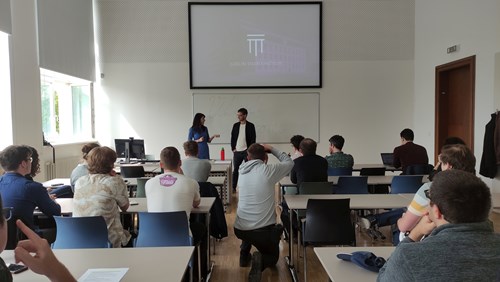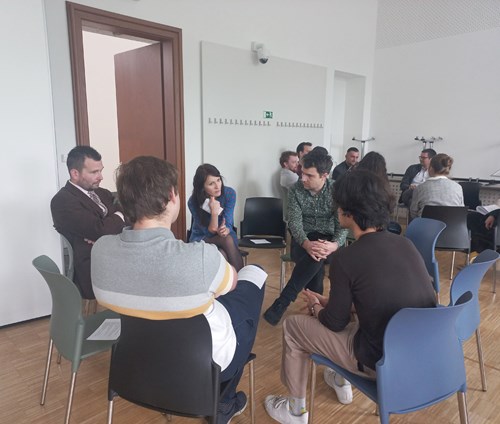That the law does not only need to be theory or experience in advocacy and at courts found out students from the Faculty of Law at Masaryk University. Judicial Studies Institute prepared its first year of an Open Day. „The aim of the event was to figuratively open „the fifth floor“ of the faculty where we are located, and to arrange a meeting of the whole research team of the Institute with the students. Only a part of the team participates in lectures at the university, some of the Institute’s members work abroad and therefore the possibilities of such meetings are rather small,“ mentioned Katarína Šipulová, the head of the Judicial Studies Institute. The Institute is primarily a research centre at the faculty and is consists of an international team which inquires into informal institutions in judiciary, currently within the INFINITY project financed by grant of the European Commission.
The Institute let the students take a look into the history of its origin, everyday activities and life in academia. „The research work does not need at all needs to be that rigid how it could seem from the first sight. Naturally, it involves a lot of intensive reading and writing, however on the other hand, we also meet up at various research seminars and workshops and as well participate in lecturing at the prominent world universities. This requires flexibility and travelling to conferences, or fieldwork travels to collect data and to record interviews,“ added Katarína Šipulová.
The Q&A format of discussions in smaller groups created room for individual questions. The interest was especially in topics related to the studies abroad, specifically at universities such as Oxford, or the Central European University. The discussion turned also to options to continue with post gradual studies and to student participation in research activities. „This is how we want to show the way forward to the active students that have a desire and ambition to learn about the world around them. The path to big projects supported by national and European institutions starts often already during studies, in informal networks and extracurricular activities. The students have possibility to take part in research also in current research projects at the university and we want to show them that the Faculty of Law is no exception,“ stated David Kosař, the head of the Department of Constitutional Law and Political Science at Masaryk University and two time holder of the prestigious ERC grant.
Judicial Studies Institute already now offers to students their engagement into the research project INFINITY and other activities of the team, mainly in a form of „student assistants“. Throughout the academic year students have an option to join research seminars, try working with data and prepare reviews for research questions. “Recently, it was mainly data coding for the research of judicial self-governance or transcription of semi-structured interviews for researching informal influences on judiciary. Nevertheless, should anybody is interested, it is possible to take part in more operational activities or editing Working Papers series or into managing social media,” informed about his experience a Faculty of Law student Jakub Novák. He added that being a “student assistant” is an experience worth having. However, he recommends to find before the actual work in a particular institute or department at least roughly what a given team or an academic is dedicated to and with who they cooperate, so they are not surprised later.
The event had an international reach and offered to students a meeting with research workers from the United Britain, The Netherlands, Slovakia and Germany. It captured also attention of the high school students who collaborate on the Moot Court project.





